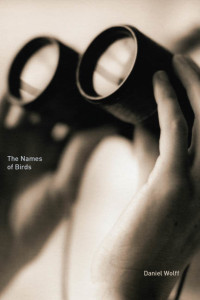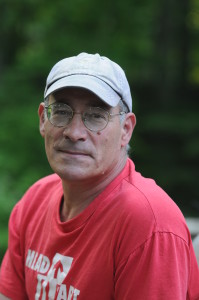 Book Title, Press, Year of Publication:
Book Title, Press, Year of Publication:
The Names of Birds, Four Way Books, 2015.
Synopsis: The Names of Birds is about birds… well, their names, really… well, how we know them… and how we know some other things, too.
What do you think makes your book (or any book) a “project book”?
If by “project book,” we mean a book that’s built around a single theme, the poems are (mostly) about birds and set out to identify how we identify them. And there’s a narrative. Or, as the last line in “Barn Owl” puts it: “I keep asking the same question.”
Why this subject (or constraint)?
Oh, I like birds. And lots of other people do. They’re common but extraordinary. So they offer a way to focus on how we see what’s around us.
Are you comfortable with the term “project book”?
Sure. Why not?
Was your project defined before you started writing? To what degree did it develop organically as you added poems?
The poems were from a specific period of two or three years and were all related. Except I added some, and subtracted some, and kept changing them. Is that organic? The project was defined pretty quickly, but the definition kept changing.
Did you allow yourself to break your own rules?
Never. I try sometimes, but I get punished for it.
How important was it for you that each poem could “stand on its own” or that the poems should rely on other poems in the book, or on the premise of the project itself, to succeed? What challenges did this present for you when writing single poems or structuring the book overall?
I wanted them to stand on their own but run in a crowd.
That sounds flip, but it’s true. And thanks for helping me realize it.
At any point did you feel you were including (or were tempted to include) weaker poems in service of the project’s overall needs? This is a risk, and a common critique, of many project books. How did you deal with this?
There were temptations everywhere, but ain’t that always the case? You keep weak poems long enough, and they’ll just die of their own weakness. Curl up and fall over. All I had to do was wait.
Did you fully immerse yourself in writing this project book, or did you allow yourself to work on other things?
This book evolved over, uh, thirty years? It would be done and perfect; then I’d take it out and see all the flaws; make it perfect again; find new flaws; etc. etc. So, I allowed myself (see rules above) to do other things. Like have kids, fix the house, write other things.
Did you ever lose momentum, bore yourself, or worry that your project could not be sustained for a full-length book? How did you push through?
I never lost momentum. I regularly bore myself. And worry seems like a practical and useful tool: let’s call it editing. If you bang your head against a wall long enough, is that considered “pushing through”?
As you were writing, were you influenced by your experience or perception of how project books are received by readers and editors (either positively or negatively)? Do you feel differently about your book being defined as a “project book” now that it has been published than you did when you were writing it?
I don’t care much how editors perceive the book. Readers, on the other hand, I care a great deal about. Their take on what I’ve made is key, and if they’d like to define The Names of Birds as a project book, I will back them a hundred percent. If they’d like to call it a milking stool, I’m interested in that, too. The main way I feel differently about the book post-publication is that it can now be read (and heard), which delights me.
Do you have a sense of whether the fact that this is a project book helped position it to find publication more easily? Has it helped you find readers?
Oh, you’d have to ask the publisher on the former. I get the impression they wanted interesting poetry, project or not. I think the subject matter (birds) has helped the book find some readers who would otherwise be scared off. What it does with readers once it finds them, I don’t know.
As a reader, are you drawn to project books? What project books have influenced you or have you enjoyed, and what do you think makes those books successful?
Oh, sure. Patterson by William Carlos Williams. W.B. Yeats’ work (though $50 to the first person who can define what the project was). James Merrill’s The Changing Light at Sandover. The Dream Songs by John Berryman. That secret project Emily Dickinson crocheted. I’ve also been influenced by concept albums (Marvin Gaye’s What’s Going On etc.). N.B.: if it’s music, the project is called a concept.
What effect do you think the prevalence of project books is having on poetry in general?
I have no idea. Was The Iliad a project book?
Have you abandoned other project attempts? How did you know it was time to let go? What happens to project poems that never amass a full-length book?
I don’t let go. My experience has mostly been that whether the poems amass a full-length book or not, they tend to remain in my file cabinet.
After completing a project, how did you transition into writing something new? What are you working on now? Another project?
I am usually simultaneously working on a number of different things, so the “new” one is the one that isn’t finished. I’m in the middle of a number of projects that discretion doesn’t allow me to reveal. Or maybe that’s self-preservation. I keep them fully wrapped till I think they’ll look ok naked.
What advice can you offer other writers, particularly emerging writers or poetry students who may be using the project book as a guiding principle for their own work?
Oh, I wouldn’t venture advice beyond “keep writing.” Which is plenty.


